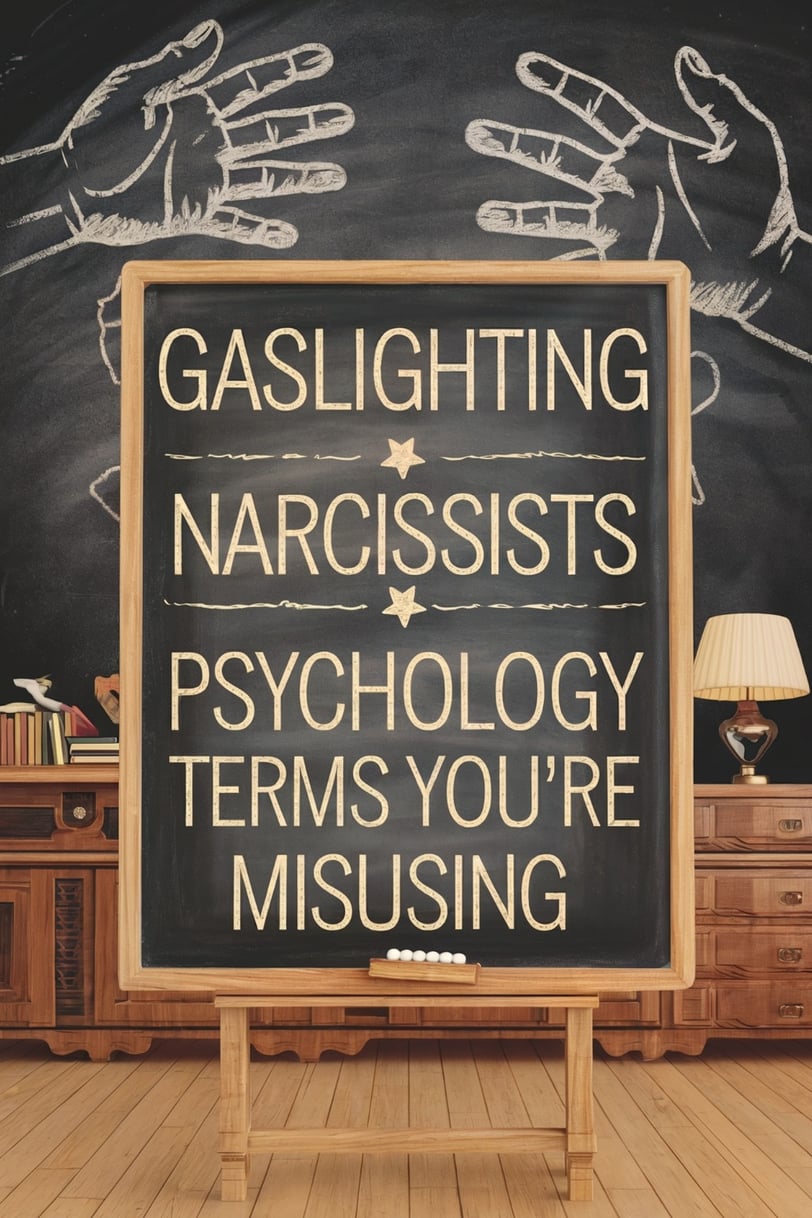Gaslighting, Narcissists, and Psychology Terms You’re Misusing: IMC Explained
Learn the true meanings of gaslighting, narcissists, and more psychology terms we misuse. Avoid diluting their power and foster deeper mental health understanding.
Abuse No More
3 min read


Are You Using These Psychology Terms Correctly?
Have you ever called someone a “narcissist” just because they seemed self-absorbed? Or described a mildly upsetting experience as “traumatizing”? These buzzwords, born in psychology, have taken over social media, but are they being used correctly—or at all as intended?
Misusing terms like gaslighting and triggered not only dilutes their meaning but can also harm conversations around mental health. By misapplying these words, we risk trivializing serious issues that deserve understanding and nuance.
Let’s Identify, Minimize, and Control (IMC) the misuse of popular psychology terms, ensuring we reclaim their power and use them to foster better discussions.
Identify: Terms We’re Misusing and What They Really Mean
Gaslighting
What we say: “He’s gaslighting me because he disagrees with my opinion.”
What it really means: Gaslighting is a manipulative tactic used to make someone question their reality, memory, or perception. For example, insisting, “That never happened,” when it did, or belittling your feelings by saying, “You’re too sensitive.” It’s often used in abusive relationships to exert control and create self-doubt.
Traumatized
What we say: “I was traumatized when I tripped in front of everyone.”
What it really means: Trauma is not embarrassment or discomfort. It’s a profound disruption of the nervous system, often caused by events so distressing that they leave long-lasting psychological and physiological impacts. Casual use of the word undermines those suffering from genuine trauma, such as PTSD.
Triggered
What we say: “That slow walker triggered me!”
What it really means: Being triggered refers to encountering a reminder of a traumatic event, leading to distressing flashbacks or overwhelming emotional responses. For example, a war veteran might feel panicked hearing loud fireworks, as it reminds them of gunfire. This is far more serious than mere annoyance.
Narcissist
What we say: “She’s such a narcissist because she loves taking selfies.”
What it really means: Narcissistic personality disorder (NPD) is a clinical diagnosis involving traits like an exaggerated sense of importance, fantasies of power, and exploiting others for personal gain. True narcissism is not simply vanity or self-centeredness—it’s a deeply ingrained disorder requiring professional treatment.
Minimize: The Damage Misuse Can Cause
Misusing these terms may seem harmless, but it can lead to serious consequences:
Diluting Impact: Overuse can strip words of their power, making it harder for people experiencing these issues to be taken seriously.
Stigmatizing Mental Health: Throwing around diagnoses like “narcissist” or “antisocial” perpetuates harmful stereotypes.
Derailing Conversations: Incorrect usage shifts focus from meaningful discussions to surface-level misunderstandings.
For instance, casually labeling someone as “toxic” just because they upset you minimizes the experience of those genuinely harmed by abusive individuals or relationships.
Control: Reclaiming and Correctly Using These Terms
Here’s how you can use these psychology terms more responsibly:
Gaslighting
Ask yourself: Is this person intentionally making me question my reality to manipulate or control me? If not, avoid using the term.
Triggered
Before saying “I’m triggered,” reflect: Is this a serious emotional or physiological response tied to past trauma? Or am I just upset or annoyed?
Traumatized
Instead of “traumatized,” consider words like embarrassed, shocked, or hurt unless the situation truly disrupted your mental and emotional state.
Narcissist
Reserve the term “narcissist” for cases that align with clinical criteria, and avoid casually diagnosing others. Use descriptors like self-centered or attention-seeking for general behavior.
Examples of Other Misused Terms
Love-Bombing: True love-bombing involves manipulative displays of affection designed to control, not just excitement in a new relationship.
Toxic: Toxicity is intentional, harmful behavior—don’t confuse it with someone simply being incompatible with you.
Grooming: Grooming is the deliberate process of gaining trust to exploit someone, usually minors. It’s not just any age-gap relationship.
Trauma-Bonding: A trauma-bond is the emotional attachment between an abuser and their victim, not just sharing trauma stories.
Why It Matters
Language is powerful. By properly using terms like gaslighting, narcissist, and triggered, we can foster greater empathy, reduce stigma, and deepen our understanding of mental health. Misuse creates confusion and trivializes the experiences of those genuinely affected.
Takeaway: Words matter. Use them wisely.
